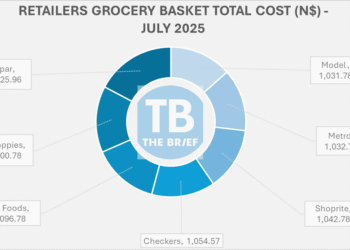
The Bank of Namibia (BoN) has launched a Cybersecurity Industry Council that is expected to play a critical role in protecting the country’s financial industry from cyberattacks.
This comes at a time when cases of cybercrime are on an increase causing trillions of dollars in financial losses and operational impacts to individual and business victims across the world.
BoN Deputy Governor Leonie Dunn said the formation of the cybersecurity council will play an essential role and bring cyber resilience to the industry.
“This forum is timely and necessary in creating a platform where the financial industry can collectively find solutions to one of the biggest risks facing the industry. I would like to reiterate that the Cybersecurity Council is a public-private partnership and not a supervisory tool in any way. I am therefore highly optimistic about our ability to collectively build cyber-resilience for the industry, to ensure financial stability for the most sought-after industry by hackers,” she said at the launch.
The central bank noted that the cybersecurity council will help ensure that a large set of issues around cybersecurity within the industry receive the necessary priority that they deserve.
“It will improve the maturity levels of cybersecurity within the Member Organisations, and the financial sector at large by enabling leaders in information security to share their knowledge within and across firms, among other ways,†she said, adding that the council will improve efficiency in cyber-risk management as institutions can leverage each other.
“The council will convene meetings of experts for a structured dialogue on cutting-edge issues and valuable personal interactions among peers. Working with all members, we can give strong support to sound public policies in Namibia and elsewhere that are designed to enhance cybersecurity. As a council, we will also be able to share information, intelligence and raise awareness of cyber threats, vulnerabilities, and incidents between Member Organisations, and provide strategic advice and guidance on handling these threats,” she explained.
Globally, there has been an unparalleled rise in crypto assets and there are discussions around the regulation of stable coins, among other technologies.
The Deputy Governor said the emergence of the COVID-19 pandemic, propelled the adoption of the fourth industrial revolution, as observed in the increased usage of digital payments that have become even more prevalent in the Namibian financial industry.
Moreover, she said some big tech companies have entered the financial markets, either directly or in partnership with financial institutions across the globe.
“This, in turn, presents new and complex trade-offs between financial stability, competition and data protection. In addition to this, the world is becoming more and more interconnected. There are fast growing chains of interdependence between countries, cities, businesses and even individuals. From the sources and flow of information, to how finances flow within our financial system, cyberspace is an intrinsic part of our lives just as the internet is,†Dunn said.
According to the Internet World Stats Report (2020), Namibia’s total number of Internet users reached an estimate of 1.3 million by December 2020, whereas the Internet users growth percentage of Namibia is at 4.4% from 2000 to 2021. Although that is a great thing, it is not without risks. Increased connectivity also leads to exposure to greater vulnerability. Information leaks, security breaches, hacks, data theft and other cyber-attacks are becoming more and more common,” she added.
To date, there is no official national cybersecurity strategy in Namibia, however the Ministry of Information and Communication Technology with the assistance of the Commonwealth Secretariat, devised some of the components of the cybersecurity strategy.
The Namibian government is currently in the process of finalising its cybercrime-related legislation which includes the draft Cybercrime Bill and the draft Data Protection Bill.
On the genesis of the Framework, Director of Banking Supervision Department at the Bank of Namibia Romeo Nel said to improve on the financial sector’s cyber maturity, the Bank decided to set up an information sharing platform which should ideally lead to a future focused strategy to combat cybercrime for the industry.
“To aid the Bank in formulation of this body, the Bank engaged the International Monetary Fund (IMF), and its AFRITAC SOUTH office for technical assistance during 2021. This gathering today is the result of this exercise and should ideally form a substantial part of the envisaged Council. The Council will set out the agenda or strategy and will be supported by a working group of cybersecurity experts,” he said.











